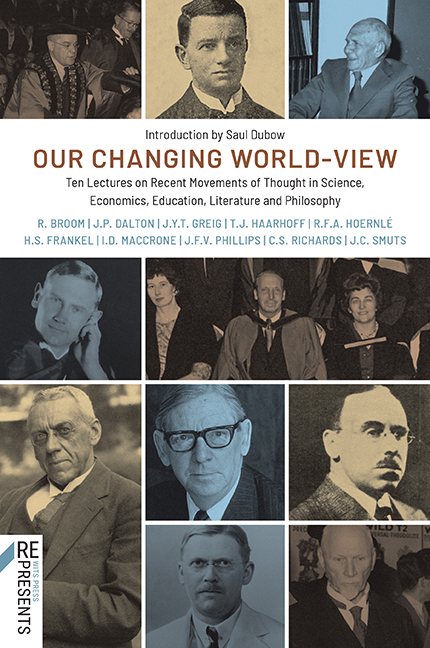 Our Changing World-View
Our Changing World-View Book contents
- Frontmatter
- Contents
- Introduction
- Preface
- Miscellaneous Frontmatter
- 1 Some Recent Scientific Advances in Their Bearing on Philosophy
- 2 The Material World—Yesterday and Today
- 3 Evolution—Design or Accident?
- 4 Man at the Crossroads
- 5 Psychology in Perspective
- 6 Literature in the Machine Age
- 7 The Holistic Attitude in Education
- 8 Our Changing Economic World
- 9 Africa in the Re-Making
- 10 Old Truths and New Discoveries
6 - Literature in the Machine Age
Published online by Cambridge University Press: 12 October 2021
- Frontmatter
- Contents
- Introduction
- Preface
- Miscellaneous Frontmatter
- 1 Some Recent Scientific Advances in Their Bearing on Philosophy
- 2 The Material World—Yesterday and Today
- 3 Evolution—Design or Accident?
- 4 Man at the Crossroads
- 5 Psychology in Perspective
- 6 Literature in the Machine Age
- 7 The Holistic Attitude in Education
- 8 Our Changing Economic World
- 9 Africa in the Re-Making
- 10 Old Truths and New Discoveries
Summary
When we look back over the course of English literature from about the year 1800 until the present time, and compare the work of the major writers with that of major writers in any earlier period, two facts emerge. The first is this: nearly all the major writers of the nineteenth and twentieth centuries, and many of the minor writers too, are ill at ease. They are not all ill at ease about the same things, and many of them are quite unable to define the causes of their discontent; but they are alike in having no firm foothold, no assured place, within the society of their own time. And the second fact is this: as the nineteenth century passes into the twentieth, literary discontent seems to increase rather than diminish, the gulf between writers and society, instead of being bridged, widens.
Some of the earlier writers of the period—those we are wont to call the Romantics—allay their uneasiness by taking refuge in some fairyland of the fancy that bears very little relation to the life of every day, or in some remote period of time the life of which appears more congenial to their troubled spirits. Coleridge flees to Xanadu or achieves a dream-like serenity with his Ancient Mariner—
Alone, alone, all, all alone,
Alone on a wide, wide sea;
or, driven back to Highgate, escapes once more into the fog of German metaphysics. Byron is for ever stridently running away; Childe Harold's Pilgrimage may not lead to anywhere in particular, but it leads very definitely away from what was troubling Byron, namely, himself, and the men and women of his time. Keats the Cockney, had he lived longer, might have achieved an almost perfect synthesis of the Greek spirit and the spirit of the English Elizabethans; but never, so far as we can tell, would he have proved the poet of his own age. Shelley has no abiding place on earth, no home except amid the clouds.
- Type
- Chapter
- Information
- Our Changing World-ViewTen Lectures on Recent Movements of Thought in Science, Economics, Education, Literature and Philosophy, pp. 127 - 144Publisher: Wits University PressPrint publication year: 2021
